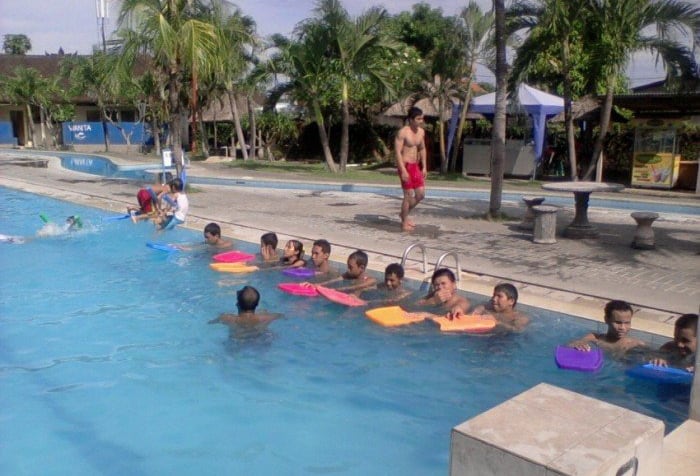
Special Needs Swimming
It is a daunting prospect for any child to learn to swim if they have not been introduced to water environments when babies or toddlers. For many reasons some children are more adventurous and easier to teach than others. Children with disabilities must, not only, overcome their fear of water but also adapt their learning to accommodate for their disability.
However, in many circumstances, particularly children with physical disabilities, learning to swim is an invigorating, empowering and liberating exercise. A water environment is an equalising medium that can see a child with disabilities progress just as quickly as an able bodied child if achievable goals are set from the outset. Learning is no different and teachers need to be patient, considerate but firm with each student.
Not only is swimming a low impact sport it also provides a full body workout. Because almost all of the major muscle groups are utilised in swimming a child’s whole body is working to pull itself through the water as they swim. Swimming promotes toning and strengthening of the muscles, greater endurance and cardiovascular health and can improve metabolism through activity.
Swimming allows a child’s body to move in ways it cannot move on land and for this reason it is particularly good for children with disabilities. Along with the physical benefits it is also a great social activity particularly for those children who are quiet, reserved or shy.
BSF Asia (BSF) provides swimming and water safety programs for children with varying disabilities including, but not restricted to, Downe Syndrome, Autism, Blind, Deaf, Mute, Cerebral Palsy and other physical disabilities. Each student has their own difficulties to overcome, however, the rewards are great – confidence, independence, improved health and greater social contact.
The teachers at BSF have been trained to international standards and their main focus is on what the child is capable of achieving rather than what they cannot do. When working with children with a disability the easiest way to lose their attention or enthusiasm is to focus on what they cannot do. Whether someone is able bodied or living with a disability no one wants the things they are unable to do to become a focal point and children with disabilities are no different.
They don’t see themselves as being disabled, what they see is their normality, it is the same every day and to them, that is normal. The teachers at BSF have learnt to treat the students exactly the same as any student that comes to their classes. They teach to the level of the child, they set realistic goals for each child, they encourage and they challenge and when the student achieves a goal, they celebrate with the child. This may be as simple as learning to float unaided, which is much harder for children with disabilities than for others.
Everyone has a centre of gravity which determines our ability to float. By moving our limbs we are able to change the centre of gravity to improve our ability to float. However, those living with a disability don’t have the same flexibility and manoeuvrability and therefor floating becomes a harder task. So when a child successfully learns to float unaided it is well worth celebrating.
The most rewarding aspect of teaching children with disabilities in the BSF programs is seeing the children coming out of their shell, opening up, becoming more and more confident, smiling, laughing and revelling in their new found freedom in the water. Through the programs and the relationships they have developed with the BSF teachers those children participating in the programs have developed confidence and skills to enable them to compete in the inaugural Bali Paragames in July 2013. Their participation and success was nothing short of inspiring for anyone who was privileged to witness it.
Children are children, they want to learn, they want to try new things and one of the biggest challenges when working with children with disabilities is allaying the fear and apprehension of the parents and/or carers. It is more often than not, the parents’ fears that restrict the activities of the children. Parents want to love and protect their children, it is a natural instinct, but when your child has a disability that instinct is intensified.
Children with disabilities are just as determined, sometimes more so, than those with abled bodies and this is no more evident than in the swimming programs at BSF Asia. They will be more determined and less likely to give up when learning a new skill, which is primarily because they have a disability. Once a person, regardless of age, living with a disability discovers their ability to improve their life, there is no stopping them, they continue to set goals and don’t give up. Any setback is not the end of the world, as with many others, it is merely seen as a sign that they need to look at another alternative.
Through the swimming programs at BSF parents and/or carers, plus our teachers, are gaining just as much as the children. They are learning that with or without a disability children can achieve anything they set their mind to, the children become the teachers and anyone who sees them achieving goals and revelling in the sheer enjoyment of their participation can only be inspired in their own life. Learning swimming and water safety is a life skill, something that could save your life and that of another and this is just as important, if not more so, for those living with disabilities.
